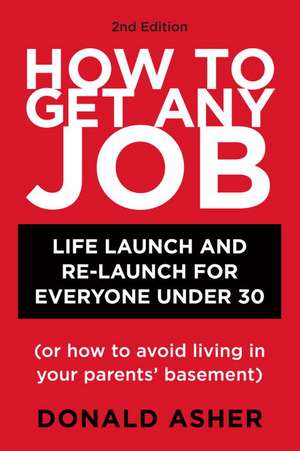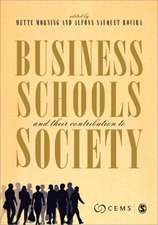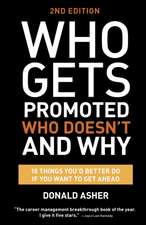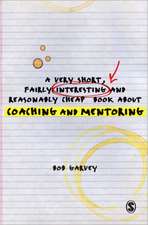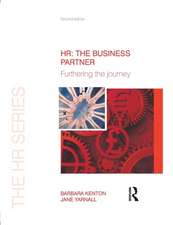How to Get Any Job: Life Launch & Relaunch for Everyone Under 30: How to Get Any Job: Career Launch & Re-Launch for
Autor Donald Asheren Limba Engleză Paperback – 30 sep 2009
HOW TO GET ANY JOB is the first book that definitively answers the following questions, and many more:
• What is "life launch" and how is it different from getting a job?
• Why do employers hire people like you?
• Which skills do employers value most? (They're not what you think!)
• How do non-tech people get hired and thrive in tech companies?
• How do you set yourself up to get promoted?
• How do you prove you have skills that don't show up on your transcripts?
• How do you get experience if you can't get a job, or have the "wrong" major?
• How can you get famous and influential people to help you?
• How do you hit restart if you get stuck in a dead-end job out of college?
• What should you do if you're a graduate and living in your parents' basement?
• What should you do if you're a junior to make sure you don't end up in that basement?
Whether you're twenty and still in college or twenty-nine and still wondering how to start your life, HOW TO GET ANY JOB offers the most creative and innovative thinking on life launch to date. It is used by college career centers nationwide.
Preț: 106.11 lei
Nou
Puncte Express: 159
Preț estimativ în valută:
20.31€ • 20.98$ • 16.90£
20.31€ • 20.98$ • 16.90£
Carte disponibilă
Livrare economică 04-18 martie
Preluare comenzi: 021 569.72.76
Specificații
ISBN-13: 9781580089470
ISBN-10: 158008947X
Pagini: 234
Ilustrații: ONE COLOR
Dimensiuni: 152 x 229 x 25 mm
Greutate: 0.33 kg
Ediția:2
Editura: Ten Speed Press
Seria How to Get Any Job: Career Launch & Re-Launch for
ISBN-10: 158008947X
Pagini: 234
Ilustrații: ONE COLOR
Dimensiuni: 152 x 229 x 25 mm
Greutate: 0.33 kg
Ediția:2
Editura: Ten Speed Press
Seria How to Get Any Job: Career Launch & Re-Launch for
Notă biografică
DONALD ASHER is one of America's premiere career consultants and is the author of The Overnight Resume, Cool Colleges, Graduate Admissions Essays, and Who Gets Promoted, Who Doesn't, and Why. He speaks at over 100 colleges and universities every year.
Extras
1: Life Planning versus Getting a Job Most college students want a job when what they should really want is a little life planning. What is life planning? Life planning is conducting a process of self-discovery and then matching what is discovered with the career marketplace. Life planning is different from getting a job. Getting a job is a process of finding paid employment, whether or not there is any match whatsoever between the employee's skills, preparation, interests, or long-term goals, plus whatever is involved in performing on the job. Getting a job is a good end product to life planning, but is not an end in itself. It is, to put it simply, not the point. The point is the self-discovery and the matching. College students have no special claim on this. A thirty-year-old, single working mother has the same opportunity to choose to get another job or choose to go through a bit of life planning. So has a fifty-year-old college professor considering leaving his tenured position. So has a sales executive with a Fortune 500 company. But college students have a unique opportunity to do this right. You have the opportunity to do this right at a juncture that can lead to a lifetime of increased happiness. Some of the mid-career executives I work with in my career coaching practice are miserable. I am struck by what a high price poor early career decisions can have. Employment is a huge part of adult life. Between the end of college and the onset of retirement, a career takes up about 100,000 hours of our lives. That's a lot of time to be miserable. And that's not counting commuting. You will not spend that much time with your kids, should you choose to have them, or with a spouse, should you choose to have one. A job doesn't have to be the most meaningful thing in your life. Perhaps your family or your religion or your volunteer or community work will be more important to you, but nothing is likely to be bigger in terms of sheer volume of time. It is a tragedy, of Shakespearean proportion, to be miserable on the job. On the other hand, if you find jobs you love, you'll never work a day in your life. You'll notice I wrote "jobs" in the plural. You will need to find many jobs after college. Your Future as a Worker According to conventional wisdom, you will need to find more than nine jobs between college and retirement. I think this is inaccurate. In fact, I believe the generation leaving college now is going to need to find some twenty to thirty jobs before retirement. The old projections were exactly that—projections of the future based on the past—assuming the future is like the past. But the future of this generation of students is different than the future of prior generations. The covenant between employers and employees has been broken. Back in the day, a white-collar worker had a job until she retired. In actual fact, that often didn't happen. But it was the operative theory. This is no longer the operative theory. A company's covenant now with its employees goes something like this: "If our needs mutually converge, great! If they don't, see ya!" This fact changes the way all workers should approach their work life. You have to be ready all the time to find a new job. Let me be clear about what I'm telling you: You will be fired through no fault of your own during your work life. You will go to work one day and find that you or your department or your office or even your entire company is no longer in business, and suddenly you need a new job. You may see it coming or you may not, but you can't say you weren't warned. Not only will you need to find many jobs over your working lifetime, you will also pass through periods of self-employment and portfolio employment. Self-employment includes, obviously, those times when a careerist launches an entrepreneurial endeavor. But it also includes millions of workers who cannot find a job and are forced to let their services out on a contract basis, catching an assignment here, a project there, to get through a tight spot in a specific industry or local economy. Portfolio employment is both old and new. The idea of portfolio employment goes back to the days of craftsmen's guilds, when a worker had a skill that was so valued he could set the terms of engagement with an employer or a series of simultaneous employers. The worker was like a little factory, free to trade with many buyers. Now it means someone who has several revenue streams instead of a job. The worker becomes like a little company, with more than one customer and perhaps more than one product line. There'll be more discussion of this later in the book. Job change may come up some twenty or thirty times for you, but other major career shifts are also on your horizon. It's one thing to find another job that you like better than the last, but it's another thing entirely to find a new career that you like better than the last. I haven't been able to find any usable research on this topic, but it seems to me that most people have at least two distinct careers, and some have five or more. The problem with this topic is it is very hard to define a career. Does a nurse who goes to medical school and becomes a doctor have a new career, or is he just continuing with his career in health care? Does a real estate agent who becomes a developer have a new career, or is she just continuing with her interest in providing housing for families? It can be argued either way. My observation of real people with real work lives is that most people have major shifts somewhere in their futures. I know a college professor who turned his hobby into a multimillion-dollar business. I know a soldier who became an engineer who became a real estate magnate. I know a warehouse worker who went back to college and became a high school principal. And so on. Big Changes Are in Your Future And you can make mistakes in your work life. In fact, feel free to make mistakes. One of things I love most about this country is that it is the land of second chances. You can fix a bad work situation anytime. In America you are not sentenced to pursue the choices that your mother or father pursued. Your family name or tribe or clan or caste does not determine your career. Your major in college does not determine what you get to do for the rest of your life. If your job or your field is no longer attractive to you, you can go in a new direction. You are in charge. What does this have to do with life planning and getting a job? Every single time you change jobs, you have a choice: to go get another job or to do real life planning. In fact, you have a much greater chance to be happy with your work life today than in prior generations, because you have a far greater number of opportunities to change your employment situation. Every transition is an opportunity to seek employment more meaningful, more fun, more rewarding, and more to your liking. Change Is Good One thing should be clear: It is not acceptable to fail to learn how to do life planning. It's not something that you do once, right out of college, and then don't worry about again. It's truly a life skill, something that you need to know how to do in order to succeed in your life. Don't skip this class. Your first task is to unlearn what you know about the relationship between college and work. The Relationship between College and Work This is a book about getting jobs out of college, not about choosing a major. If you want to know more about choosing a major, see College Majors Handbook by Neeta Fogg, Paul Harrington, and Tom Harrington, which is an outstanding study of majors and career outcomes, and The Undecided College Student by Virginia Gordon, which is written for advisors. Choosing a major is a big deal, but I am going to assume you've already chosen it and the only issue now is launching a successful life after college. Let's think about the link between major and employment and long-term life success. How did you pick your major? Because you loved the subject, or because you thought it would help you get a job after college, or to please your parents, or some combination of the above? We often go to college for the wrong reasons, and then compound the error when we try to launch a life afterward. To put it plainly, those who go to school primarily in order to get a job are often poorly served by doing so. They are ill-served during the college experience itself and ill-prepared for the employment marketplace afterward. Don't worry if you are starting to worry if this is you; it can be fixed. But let's review how this can happen. Students may choose a major in order to have the career that they believe goes with that major. For example, they decide to become a chemical engineering major because they heard somewhere that chemical engineering majors are the highest paid upon graduation from college or university. Or they take premed classes because they think it will increase their chances of getting into medical school. Or they take engineering because their parents want them to become engineers and, their parents believe, there are always plenty of high-paying jobs for engineers. Or they pursue accounting or nursing because they think they want to be accountants or nurses. In short, they are choosing majors because of the career outcomes of those majors, not because of any inherent desire to learn those subjects. The problem is that these decisions are made at age eighteen or nineteen, often without any career advice at all or with advice of the very worst sort. For illustration purposes, let's examine some of the hidden biases in the above choices. For example, it is true that chemical engineering consistently draws top salary offers, but that would be irrelevant if you didn't like chemical engineering or couldn't succeed at it. It is not true that choosing a premed major makes you more likely to get into medical school; as long as you do well in the prerequisite courses, you can major in anything. It is not true that there are always plenty of jobs for engineers, either. It is true that majoring in nursing or accounting prepares you for careers in nursing or accounting, but it is equally true that majoring in nursing or accounting can lead to many other careers. Question: What do these five college graduates have in common? Bank officer Stock market analyst Music therapist Director of a senior citizens' center Field archaeologist Answer: They were all French majors at the same college.1 Can philosophy and English majors survive on Wall Street? Of course! According to two major studies on the topic, liberal arts majors get promoted faster and tend to rise higher on the organizational charts than engineering and business majors hired at the same organization at the same time.2 This is not to say that your major has no impact on your earnings; it does, but other studies show that hours worked, gender, attainment of advanced degrees, being taller than average in high school, if male, and being more attractive than average—but not drop-dead gorgeous—are influences on earnings. But no one is suggesting that you change your gender or become taller in high school if that is not your nature. All types of companies hire all types of majors. Even in high-tech companies, one quarter of the people employed do not have technical degrees. (If you want to know more about this, read William A. Schaffer's High-Tech Careers for Low-Tech People.) And as it turns out, music is not an uncommon major among computer programmers. Einstein studied music passionately, in addition to physics. Writing well, which is something one learns to do in an English lit program, is in such demand in all types of organizations that it is considered a key to management advancement. According to research monitored by Dr. Howard Figler, a consultant to university career centers, between 40 and 60 percent of all CEOs majored in the liberal arts as undergraduates. They would presumably have majored in such things as philosophy, music, and English literature before going on to become scions of business. These data may be influenced by issues related to class as well as choice of major, yet the inference can be made that future CEOs can start with any major. I am appalled, even horrified, that you have adopted Classics as a major. As a matter of fact, I almost puked on the way home today. I am a practical man, and for the life of me I cannot possibly understand why you should wish to speak Greek. —From a letter from Ed Turner to his son, Ted.3 There is an old saying in career counseling: Your major may help you get a job in the first place, but it is your education that helps you get promoted. I will go further and say that an undergraduate curriculum can best provide an education, while graduate school can best provide specialization. Continuing your education past the baccalaureate level is actually a much bigger influence on earnings than your choice of an undergraduate major. More than half the workers in America have been to college,4 so it's just not that powerful a ticket, all by itself. Of course, if you are only interested in money, skip college and become a longshoreman. They earn an average of $107,000 per year in West Coast ports, and a foreman can bring in $167,000.5 Although it is true that all art majors earn less than all engineering majors, it is not true that you as an art major would learn less than you as an engineering major. Here's a truism for you: Individuation will always exceed group norms. One of the most successful business people I know was an art major, and his company sells products you can buy in any hardware store in the country. Further, when students pick majors based on career outcomes, they sometimes pick majors they don't really enjoy. Sometimes this is true even if they would have enjoyed the career associated with the major. As just one example, a lot of premed majors would make excellent doctors, but get turned off by years of laboratory sciences that have little relevance to the curriculum or clinical training provided in medical school. Or they blow their GPAs studying subjects that aren't really required for success in medical school, and then can't get in because of a tarnished record. However, this is not an invitation to change your major if you're on track to graduate. If you're looking down that short tunnel to commencement, don't endanger that. Get the job done and graduate on time. But more importantly, don't compound a poor choice of major with a poor choice of career direction. Here is the biggest secret in life planning: You can get any job with any major. I don't mean that all majors prepare you for all jobs equally well, but I do mean that at the juncture of college graduation, no job is inherently sealed off to you simply and solely because of your major. For example, I don't mean to imply that it is easy to get a job in accounting if you've never taken a class in accounting, but it is not at all out of the question. It is entirely possible if you want it. I knew a college student who was a marketing major, who got a temp job with an accounting firm the summer before graduation. He helped out with some accounting and found out he liked it. He didn't change his major, but he did stay in contact with the firm during his senior year. Upon graduation they hired him, and after a few night classes, he's an accountant today. Let me be doubly clear in my purpose of discussing the relationship between majors and possible job choices: I don't want you to abandon your major or doubt the wisdom of your choice. I want you to abandon the limitations you have put on yourself. You cannot do real life planning while you are accepting a preordained conclusion. Most people receive tons of career advice and influence from family, friends, neighbors, faculty, and the media that simply don't hold up under scrutiny. Chance, inclination, and extra hard work are far more important in the long run than your major—or even your GPA or whether you were a tall male in high school. Let's consider what employers themselves say they want in their new hires. According to a survey of corporate recruiters by the National Association of Colleges and Employers, here are the top characteristics of new hires in order of importance: Communication skillsStrong work ethicTeamwork skills InitiativeInterpersonal skillsProblem-solving skillsAnalytical skillsFlexibility/adaptabilityComputer skillsTechnical skillsDetail-orientedOrganizational skills You'll notice that any student with any major could easily possess all of these attributes. We'll address what kind of computer skills employers want in a later section, but suffice it to say that the typical college student possesses most of them. Some majors are obviously preparatory for a particular type of career, for example, elementary education. You can predict that a student pursuing this major plans to start her career as an elementary school teacher. In practice, however, careers change and evolve from the initial post-college job in ways that are simply not that predictable, even for those students who have a clear starting point. By investigating real people and actual employment patterns, you will see how this works: Comedian Stephen Colbert was a philosophy major.Young MC, music mogul, was an economics major.Chad Hurley, founder of YouTube, was an art major.Basketball star Michael Jordan was a geography major.Alan Greenspan, former chairman of the Federal Reserve Board, started out as a music major.Comedian Jon Stewart was a psychology major.Actress Lisa Kudrow was a biology major.Scott Adams, creator of the Dilbert comic strip, was an economics major. Carly Fiorina, former CEO of Hewlett-Packard, was a philosophy major.Arnold Schwarzenegger, former Mr. Universe, film star, and now governor of California, was an economics major.Comedian and late night talk show host Jay Leno was a philosophy major.George W. Bush, former president of the United States, was a history major and is famous for saying this: "To the C students, I say, 'You, too, can be president of the United States.'" In any case, I think you must agree by now that your major doesn't determine the first job you should seek after college.
Recenzii
“a clear process for job search that will work at any age.”
—Syndicated “Working Strategies” career columnist Amy Lindgren
“Career guru Donald Asher has updated his job search bible...perfect for every soon-to-be college grad who hasn’t thought beyond finding paid employment in order to get out of his parents’ house.”
—BookPage
—Syndicated “Working Strategies” career columnist Amy Lindgren
“Career guru Donald Asher has updated his job search bible...perfect for every soon-to-be college grad who hasn’t thought beyond finding paid employment in order to get out of his parents’ house.”
—BookPage
Cuprins
Contents
PART 1
You Need to Reconsider Everything You Know about Your Employment Interests
1 Life Planning versus Getting a Job 3
2 Yes, It's All about You 20
3 What Gets You Excited? Your Top Five Issues in This World 31
4 A Little Future Visioneering 43
5 Advanced Issues in Life Planning: More than Enough Ideas 53
6 A Different Kind of Choice 74
Part 2
Finding Out about Your Interests in the Real World
7 Prepare to Learn More 85
8 Are You Ready for Networking? 93
9 Volunteer and Internship Opportunities 107
10 Summer Jobs, and "The Most Important Summer of Your Life" 119
11 More Education 134
12 How about High-Risk Choices? 143
Part 3
Now It's Time to Actually Get a Job
CASE STUDY: How I Got My First Job 158
13 Start with a Job Target 161
14 Visualize the Job You Want 171
15 Troubleshooting Your Job Search 184
16 The Job Interview 203
In Conclusion 227
Index 229
About the Author 234
PART 1
You Need to Reconsider Everything You Know about Your Employment Interests
1 Life Planning versus Getting a Job 3
2 Yes, It's All about You 20
3 What Gets You Excited? Your Top Five Issues in This World 31
4 A Little Future Visioneering 43
5 Advanced Issues in Life Planning: More than Enough Ideas 53
6 A Different Kind of Choice 74
Part 2
Finding Out about Your Interests in the Real World
7 Prepare to Learn More 85
8 Are You Ready for Networking? 93
9 Volunteer and Internship Opportunities 107
10 Summer Jobs, and "The Most Important Summer of Your Life" 119
11 More Education 134
12 How about High-Risk Choices? 143
Part 3
Now It's Time to Actually Get a Job
CASE STUDY: How I Got My First Job 158
13 Start with a Job Target 161
14 Visualize the Job You Want 171
15 Troubleshooting Your Job Search 184
16 The Job Interview 203
In Conclusion 227
Index 229
About the Author 234
